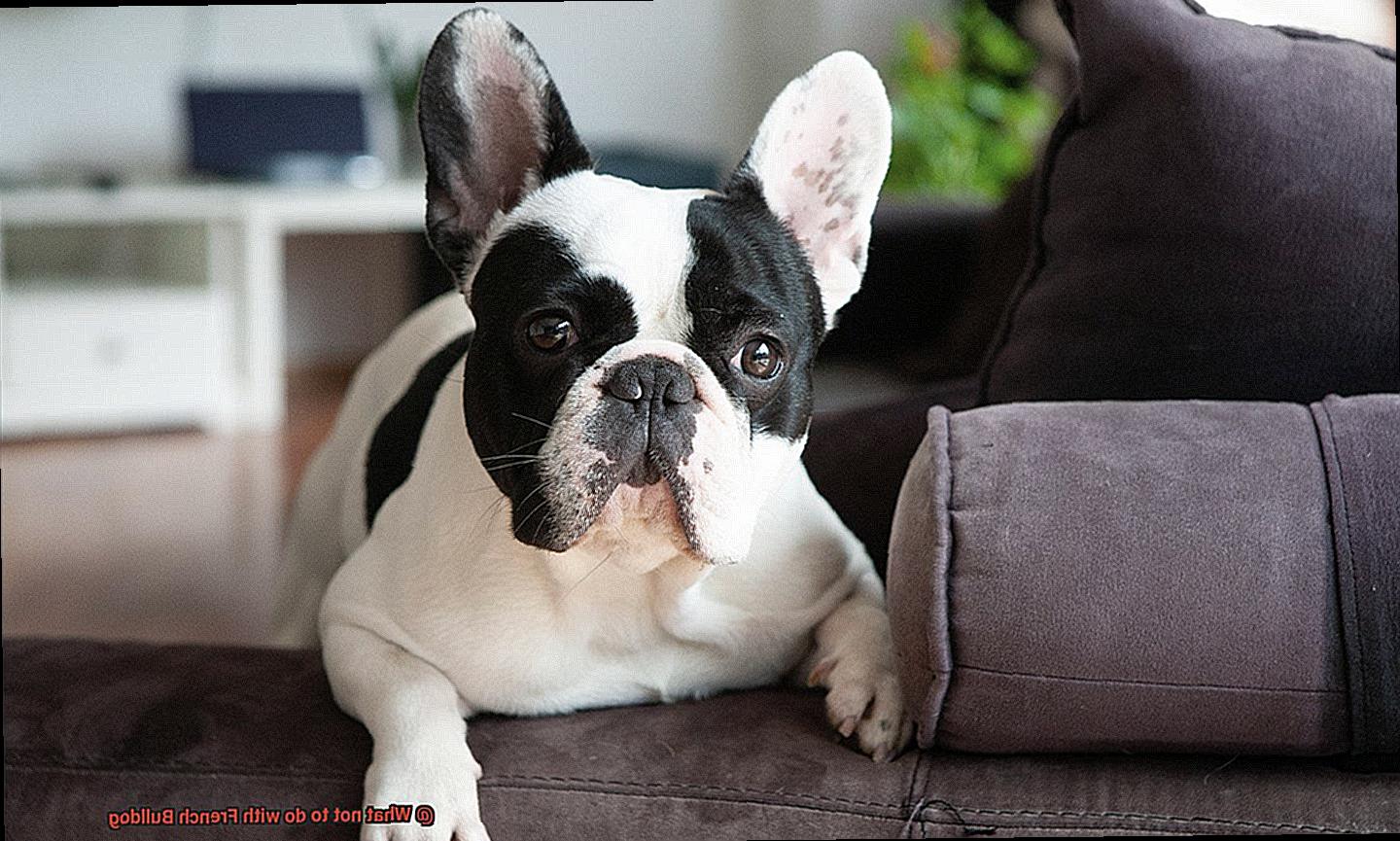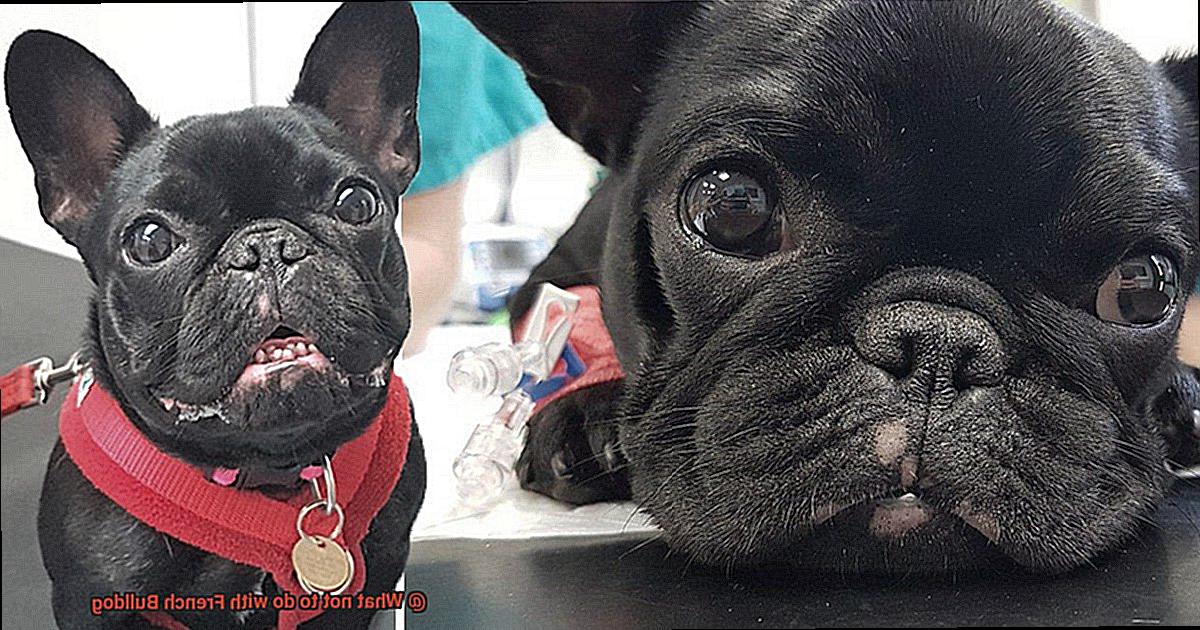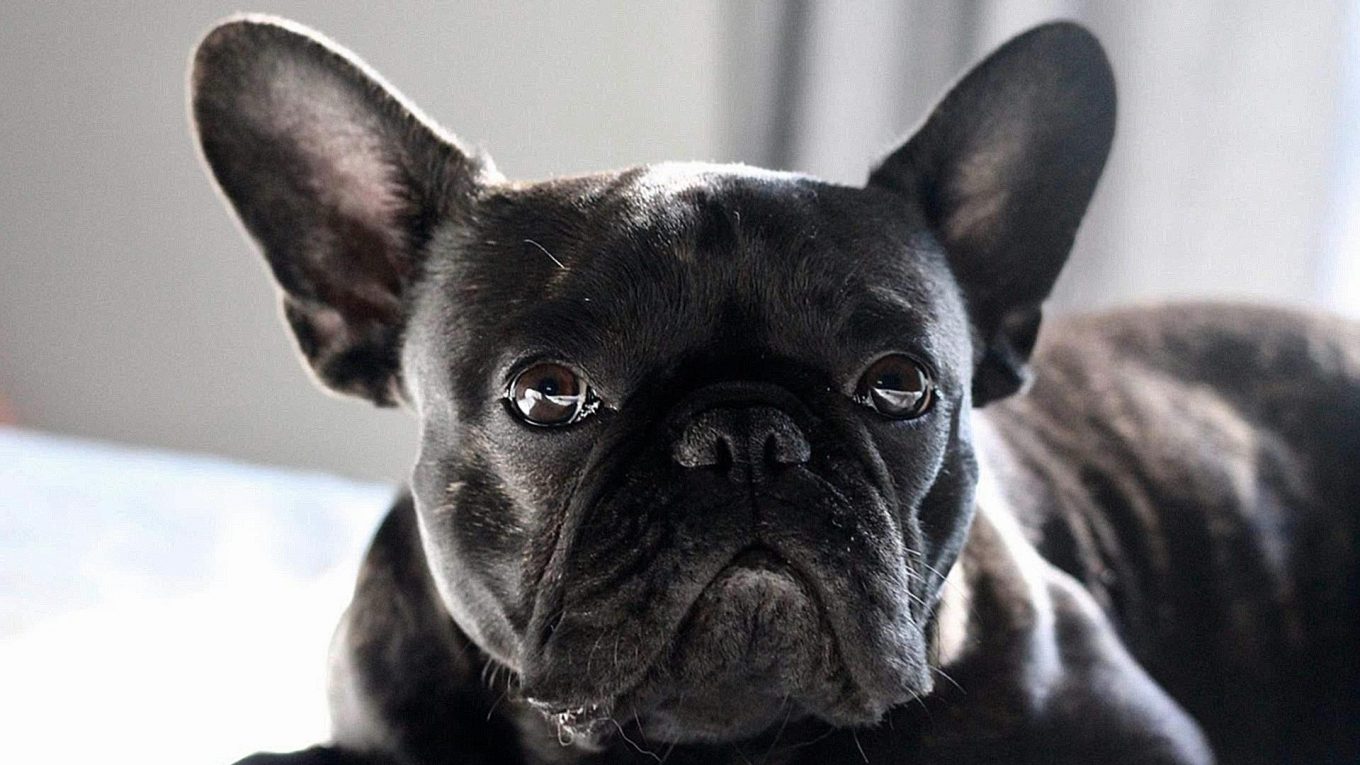What not to do with French Bulldog?
French Bulldogs, those little bundles of joy with their playful personalities and squishy faces, have skyrocketed in popularity. But being a responsible owner means avoiding common mistakes that can impact your Frenchie’s health and happiness. In this blog post, we’ll explore the top blunders pet owners often make when caring for their French Bulldogs. From nutrition pitfalls to exercise misconceptions, we’ll cover it all. So grab a cup of coffee, get cozy, and let’s dive into what not to do with your French Bulldog. Get ready to learn how to enhance your furry companion’s quality of life.
Avoid Leaving Your French Bulldog Alone for Too Long
Contents
- 1 Avoid Leaving Your French Bulldog Alone for Too Long
- 2 The Dangers of Overexercising Your French Bulldog
- 3 Grooming Needs of a French Bulldog
- 4 Maintaining Oral Hygiene in French Bulldogs
- 5 The Importance of Feeding Your French Bulldog the Right Diet
- 6 Taking Care of Your Frenchie’s Mental Health
- 7 Understanding Common Health Issues in French Bulldogs
- 8 Ensuring Safety and Comfort for Your Frenchie
- 9 Conclusion
If so, you probably already know that these adorable pups are incredibly affectionate and sociable. They thrive on human companionship and can suffer from separation anxiety if left alone for too long. In this article, we’ll explore why it’s crucial to avoid leaving your French Bulldog alone for extended periods and provide practical tips to ensure their well-being and happiness.
The Emotional Toll of Isolation:
French Bulldogs are known for their loving nature and strong attachment to their families. When left alone for too long, they can experience separation anxiety, which can lead to destructive behaviors like chewing furniture or excessive barking. Additionally, prolonged isolation may even result in depression, causing your furry friend to become withdrawn or lethargic.
Strategies to Keep Them Company:
To prevent these issues, consider the following strategies:
- Hire a dog sitter or walker: A trusted professional can visit your home during the day, providing companionship and exercise for your French Bulldog.
- Enroll them in doggie daycare: This option allows them to interact with other dogs while receiving supervised care and attention.
- Bring them to work or a trusted friend’s place: If possible, take your French Bulldog with you or arrange for them to stay with someone you trust during the day.
Mental Stimulation is Key:
In addition to social interaction, mental stimulation is essential for your French Bulldog’s well-being. Interactive toys, puzzle games, and training sessions can keep their minds engaged while you’re away. This not only prevents boredom but also helps alleviate separation anxiety.
Every Dog is Unique:
Remember that each French Bulldog has its own temperament and coping mechanisms when it comes to being alone. While some may handle it better than others, it’s crucial to prioritize their well-being and ensure they receive the attention and companionship they crave.
The Dangers of Overexercising Your French Bulldog
As a proud French Bulldog owner, you probably already know that these adorable little pups have some unique health considerations.
One of the most important things to keep in mind is the potential dangers of overexercising your Frenchie.
In this article, we’ll explore why it’s crucial to be mindful of their exercise limitations and how to keep them safe and healthy.
Respiratory Challenges
French Bulldogs are a brachycephalic breed, which means they have short snouts and flat faces. While this feature gives them their cute and distinctive appearance, it also comes with some respiratory challenges. Their shortened airways make it more difficult for them to breathe properly, especially during intense physical activity.
Overexertion can cause your Frenchie to struggle even more with breathing, leading to excessive panting and difficulty catching their breath. This can be dangerous and potentially lead to respiratory distress or even collapse. So, it’s crucial to be mindful of their exercise intensity and duration.
Heat-Related Issues
Another significant concern for French Bulldogs is their compromised ability to regulate their body temperature. Due to their short snouts and restricted airways, they are more prone to heat exhaustion and heatstroke. Overexercising can cause their body temperature to rise rapidly, putting them at risk of potentially life-threatening conditions.
To prevent heat-related issues, it’s essential to avoid exercising your Frenchie during extreme heat or humidity. Opt for early morning or late evening walks when the temperature is cooler. Always provide fresh water and shade during exercise breaks to keep them hydrated and cool.
Joint and Bone Problems
French Bulldogs have compact bodies and short legs, which means they put extra strain on their joints during physical activity. This makes them more susceptible to joint and bone problems such as hip dysplasia and patellar luxation. Overexercising can exacerbate these conditions and potentially lead to chronic pain and mobility issues for your Frenchie.
Moderation is Key
While regular exercise is essential for your Frenchie’s overall health, it’s crucial to do it in moderation and tailor it to their individual needs. Short walks and gentle play sessions are generally sufficient for this breed. Avoid high-impact activities or long-distance running that can put excessive strain on their bodies.
Signs of Overexercising

It’s important to pay attention to your Frenchie’s cues during exercise and watch for signs of overexertion. Excessive panting, difficulty breathing, lethargy, lameness, and reluctance to move are all indicators that your furry friend may be pushing themselves too hard. If you notice any of these symptoms, it’s crucial to stop the exercise immediately and seek veterinary advice.
Grooming Needs of a French Bulldog
Grooming is an essential part of caring for your French Bulldog. While they may not have extensive grooming needs like some other breeds, it’s crucial to understand the specific requirements of these adorable dogs to keep them looking and feeling their best. In this comprehensive guide, we will cover all aspects of grooming a French Bulldog, from coat care to nail trimming and ear cleaning. So let’s dive in.
Coat Care:
- Avoid shaving or trimming their coat too short, especially during warmer months, as it provides insulation and protection from the sun.
- Regular brushing with a soft-bristled brush or grooming mitt helps remove loose hair and distribute natural oils, keeping their coat healthy and shiny.
Bathing:
- Use a mild, hypoallergenic shampoo formulated specifically for dogs with sensitive skin.
- Avoid using human shampoos or harsh chemicals that can irritate their skin.
- Consult with a veterinarian if you notice any signs of skin irritation or excessive itching after bathing.
Nail Trimming:
- Regularly trim their nails to avoid discomfort and joint problems.
- Exercise caution as French Bulldogs have a quick, which is the blood vessel inside the nail.
- Consult a professional groomer or veterinarian for guidance on proper nail trimming techniques.
Ear Care:
- French Bulldogs have bat-like ears prone to collecting dirt, debris, and moisture.
- Regularly inspect and clean their ears with a veterinarian-approved ear cleaner to prevent infections.
- Be gentle during this process and avoid inserting anything deep into their ear canal to prevent injury.
Heat Sensitivity:
- French Bulldogs are prone to overheating due to their short snouts and compact build.
- Avoid grooming practices that can exacerbate this issue, such as shaving their coat too short.
- Provide plenty of shade, fresh water, and limit strenuous activities during hot weather.
Maintaining Oral Hygiene in French Bulldogs
Did you know that these lovable pups are prone to dental issues? That’s right, those adorable little teeth need some extra TLC to keep them in tip-top shape. As an expert in French Bulldog care, I’m here to share my top tips for maintaining oral hygiene in these furry friends.
So, let’s get started.
Brushing: A Pearly White Routine

Regular brushing is the key to a healthy smile for your French Bulldog. Aim to brush their teeth at least two to three times a week using a dog-specific toothbrush and toothpaste. And remember, never use human toothpaste as it contains ingredients that are toxic to dogs.
Start by introducing the toothbrush and toothpaste gradually, allowing your Frenchie to get used to the taste and sensation. Be gentle and patient during the brushing process, ensuring you reach all surfaces of their teeth.
Chew Toys: Fun and Dental Health Combined
Who doesn’t love a good chew toy? Well, your French Bulldog certainly does. Providing appropriate chew toys not only keeps them entertained but also helps scrape away plaque and tartar from their teeth.
Look for dental chew toys specifically designed for dogs, as they are made with materials that are safe for chewing and promote dental health. It’s like hitting two birds with one stone – happy pup and a healthy smile.
Dental Check-Ups: The Vet’s Expertise
Regular dental check-ups with your veterinarian are essential for maintaining oral hygiene in French Bulldogs. These professionals can perform professional dental cleanings when necessary to remove stubborn tartar and plaque that regular brushing alone can’t tackle.
During these check-ups, your vet will also examine your Frenchie’s teeth and gums for any signs of infection or dental problems. Trust me, your vet is your French Bulldog’s oral health superhero.
Diet: The Food for Healthy Teeth

What you feed your French Bulldog plays a crucial role in their oral health.
Avoid high-carbohydrate and sugary diets, as these can contribute to plaque formation and increase the risk of dental issues. Instead, opt for a balanced and nutritious diet specifically formulated for French Bulldogs, promoting overall health, including dental health.
The saying “you are what you eat” applies to our furry friends too.
Avoid Harmful Practices: No Bones About It
While we’re on the topic of diet, let’s talk about what to avoid.
Say no to giving your French Bulldog human food that is harmful to their teeth – think sugary treats, hard candies, or bones. These can cause tooth fractures, gum injuries, or even choking hazards.
Stick to dog-friendly treats and snacks that are safe for their oral health. Your Frenchie will thank you.
The Importance of Feeding Your French Bulldog the Right Diet
One of the most important aspects of their care is ensuring they are fed a balanced and nutritious diet. In this article, we will explore why feeding your French Bulldog the right diet is vital for their overall health and well-being.
Avoiding Health Issues:
French Bulldogs are prone to certain health issues, including obesity, allergies, and gastrointestinal problems. Feeding them the right diet can help prevent these issues and ensure they lead a healthy and happy life. By providing them with a balanced and nutritious diet, you are supporting their immune system, reducing the risk of allergies, and maintaining a healthy weight.
Choosing High-Quality Dog Food:
When it comes to feeding your French Bulldog, not all dog foods are created equal. It is essential to choose high-quality dog food that is specifically formulated for their breed and age. This ensures that they receive the necessary nutrients in the right proportions. Look for dog food that contains real meat as the primary ingredient and avoid foods with artificial additives or fillers.
Say No to Table Scraps:

While it may be tempting to share your meals with your French Bulldog, it’s important to avoid feeding them table scraps or human food. Certain human foods can be toxic to dogs and cause serious health problems. Stick to feeding them a balanced diet designed for their nutritional needs.
Portion Control:
French Bulldogs have a tendency to overeat and gain weight easily. Therefore, it is crucial to practice portion control. Measure their food portions according to the guidelines provided on the packaging or consult with your veterinarian for personalized recommendations. Avoid free-feeding and establish regular meal times.
Balanced Nutrients:
To ensure optimal health, your French Bulldog’s diet should include proteins, carbohydrates, fats, vitamins, and minerals. Consult with a veterinarian or a canine nutritionist to determine the right balance of nutrients for your dog. They can help you choose the appropriate dog food or create a tailored meal plan for your French Bulldog.
Monitoring Weight:
Regularly monitor your French Bulldog’s weight and adjust their diet accordingly. If they are gaining weight or becoming overweight, it may be necessary to reduce their food intake or switch to a weight management formula. Maintaining a healthy weight is crucial to preventing obesity-related health issues.
Taking Care of Your Frenchie’s Mental Health
Taking Care of Your Frenchie’s Mental Health
Creating a Stable Environment
French Bulldogs thrive on routine and consistency. Establishing a daily routine that includes regular feeding, exercise, playtime, and rest is essential for their mental well-being. Dogs feel secure when they know what to expect, so try to stick to a schedule as much as possible.
Providing Mental Stimulation
Frenchies are intelligent and curious dogs that need mental stimulation to prevent boredom and keep their minds sharp. Provide them with a variety of toys, puzzles, and interactive games to keep them engaged. Mental activities like hiding treats or teaching them new tricks can also be beneficial.
Proper Socialization
Socialization is crucial for French Bulldogs to develop confidence and reduce the risk of anxiety or fear-based behaviors. Introduce them to different people, animals, and environments from an early age. Puppy socialization classes or supervised playdates can help them learn how to interact with others in a positive way.
Positive Reinforcement Training
When training your Frenchie, use positive reinforcement techniques such as treats, praise, and affection. Harsh punishments or negative reinforcement can harm their mental health and lead to fear or aggression issues. By rewarding good behavior, you’ll create a strong bond and boost their self-confidence.
Recognizing Signs of Stress or Anxiety
It’s important to be observant and recognize signs of stress or anxiety in your Frenchie. Excessive barking, destructive behavior, excessive drooling, or withdrawal may indicate that something is wrong. If you notice any of these signs, consult with a professional dog trainer or behaviorist who specializes in French Bulldogs.
Love and Attention
French Bulldogs thrive on human companionship and may suffer from separation anxiety if left alone for long periods. Make sure to spend quality time with your Frenchie every day, providing them with love and attention. Engage in activities they enjoy, such as cuddling on the couch or going for walks together.
Conclusion
Understanding Common Health Issues in French Bulldogs
French Bulldogs are adorable and lovable companions, but they are also prone to certain health issues. As an expert in French Bulldog care, I want to provide you with the necessary information to ensure your pet’s well-being. In this section, I will discuss common health issues in French Bulldogs and offer advice on how to prevent and manage them.
- Brachycephalic Airway Syndrome: French Bulldogs have a unique anatomy with a shortened snout and a compacted upper respiratory system, which can lead to breathing difficulties. To prevent exacerbating their breathing problems, avoid activities that can strain their airways, such as overexertion or exposure to extreme temperatures. Additionally, keep them calm and stress-free, as stress can also worsen their breathing.
- Allergies: French Bulldogs can develop allergies to certain foods, environmental allergens like pollen or dust mites, or even certain medications. It is important to identify and avoid triggers that can cause allergic reactions in your Frenchie. Consult with your veterinarian to determine the best diet and environmental modifications for your pet.
- Obesity: Obesity is a significant health concern for French Bulldogs as it can lead to joint issues, heart disease, and diabetes. To prevent obesity, provide your Frenchie with a balanced diet consisting of high-quality dog food and appropriate portion sizes. Avoid overfeeding or giving too many treats. Regular exercise is also crucial for maintaining a healthy weight.
- Skin Problems: French Bulldogs have sensitive skin that is prone to dryness, itching, and infections. To prevent skin problems, avoid using harsh chemicals on their skin and use gentle grooming products specifically formulated for sensitive skin. Regularly clean and groom them to remove dirt and debris that can irritate their skin.
- Eye Problems: French Bulldogs are susceptible to various eye conditions such as cherry eye (prolapse of the third eyelid), corneal ulcers, and dry eyes. Handle their eyes with care and be vigilant for any signs of eye abnormalities or symptoms. If you notice any issues, seek veterinary care promptly.
- Genetic Conditions: French Bulldogs are prone to genetic conditions such as hip dysplasia and intervertebral disc disease. These conditions can cause pain and mobility issues. Provide your Frenchie with proper support, such as orthopedic bedding or ramps, and avoid activities that can strain their joints or back.
By being aware of these common health issues and taking necessary precautions, you can ensure that your French Bulldog lives a happy and healthy life. Regular veterinary check-ups are also essential for early detection and prompt treatment of any potential health concerns. Remember, your Frenchie’s well-being is in your hands, so prioritize their health and provide them with the love and care they deserve.
Ensuring Safety and Comfort for Your Frenchie
Frenchies have unique physical characteristics that require special attention to ensure their well-being. In this guide, I will share my expertise and provide you with practical tips to keep your Frenchie safe, comfortable, and thriving.
Creating a Dog-friendly Space:
- Puppy-proof your home by removing potential hazards like toxic plants and small objects that can be swallowed.
- Secure loose electrical cords to prevent accidents.
- Use baby gates or barriers to restrict access to dangerous areas.
Temperature Control:
- French Bulldogs are prone to overheating due to their brachycephalic anatomy.
- Keep your Frenchie in a cool and well-ventilated environment, especially during hot weather.
- Avoid leaving them in cars or exposing them to direct sunlight for extended periods.
Providing Comfortable Bedding:
- French Bulldogs have short coats and can feel cold easily.
- Provide them with soft and warm bedding options such as cozy dog beds or blankets.
- Ensure their bedding is clean and free from allergens.
Regular Grooming:
- Brush your Frenchie’s coat regularly to remove loose hair and prevent matting.
- Pay attention to facial folds and wrinkles, cleaning them gently to prevent skin irritation or infections.
- Consult your veterinarian for specialized grooming products suitable for French Bulldogs.
Exercise with Caution:
- French Bulldogs have physical limitations due to their brachycephalic anatomy.
- Opt for shorter, low-impact activities like leisurely walks or indoor play sessions.
- Avoid overexertion and watch for signs of fatigue or breathing difficulties.
Mental Stimulation and Socialization:
- French Bulldogs thrive on human interaction and can become anxious or bored if left alone.
- Spend quality time with your Frenchie, engage in training sessions, and provide interactive toys.
- Socialize your Frenchie from an early age to ensure they are comfortable with other animals and people.
Em5WE9QFfa0″ >
Conclusion
When it comes to French Bulldogs, there are some things you should definitely avoid. These little bundles of joy deserve our love and care, so let’s make sure we’re doing everything right. Here are a few key things not to do with your French Bulldog.
Firstly, never neglect their exercise needs. While they may be small in size, these dogs still require regular physical activity to keep them healthy and happy. Don’t fall into the trap of thinking that because they’re small, they don’t need as much exercise as larger breeds. Neglecting their exercise can lead to weight gain and potential health issues down the line.
Secondly, avoid leaving your French Bulldog alone for long periods of time. These dogs thrive on human companionship and can suffer from separation anxiety if left alone for extended periods. If you have a busy schedule, consider hiring a dog walker or enrolling your Frenchie in doggy daycare to ensure they get the social interaction they need.
Another thing to steer clear of is overfeeding your French Bulldog. These dogs have a tendency to gain weight easily, so it’s important to monitor their food intake and provide them with a balanced diet. Avoid giving in to those puppy-dog eyes begging for extra treats – stick to their recommended portion sizes and consult with your vet if you have any concerns about their weight.
Additionally, never ignore signs of discomfort or health issues in your French Bulldog. These dogs are prone to certain health conditions such as respiratory problems and skin allergies. If you notice any unusual symptoms or behaviors, it’s crucial to seek veterinary attention promptly. Ignoring these signs could worsen their condition or lead to unnecessary suffering.
Lastly, refrain from subjecting your French Bulldog to extreme temperatures or strenuous activities. Due to their brachycephalic (short-nosed) anatomy, these dogs are more susceptible to heatstroke and respiratory distress. Be mindful of the weather conditions and avoid exposing them to extreme heat or cold. Similarly, avoid engaging them in intense physical activities that could put excessive strain on their breathing.
In conclusion, being a responsible French Bulldog owner means knowing what not to do. By avoiding neglecting their exercise needs, leaving them alone for long periods, overfeeding, ignoring health issues, and subjecting them to extreme temperatures or strenuous activities, you can ensure your Frenchie lives a happy and healthy life.




